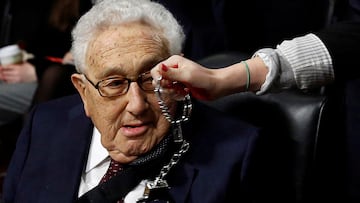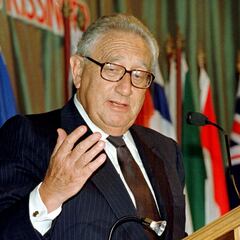Why was Henry Kissinger considered a war criminal by some?
The veteran diplomat’s time in the state department was characterised by involvement in the deaths of at least hundreds of thousands of people.


When someone dies who is 100-years old, it is not often that social media is trending with “#RIPbozo”. The death of Henry Kissinger, former US secretary of state, was bound to elicit reaction from all comers. To some, he is the person responsible for the 1973 Vietnam War ceasefire, for which he was awarded the Nobel peace prize with his Vietnamese counterpart, but to many others he is a war criminal that is reponsible for the deaths of up to 4 million people, according to historian Greg Grandin.
Political satire became obsolete when Henry Kissinger was awarded the Nobel peace prize.
Tom Lehrer, musician and academic
The belief underpinning Kissinger’s policies
Kissinger was involved in the state department from 1969 until 1977, first as an advisor before becoming secretary of state in 1973. During his studies before these roles, Kissinger developed his idea of international relations, one that can be described as Realpolitik. That is to say, the US should consider everything when deciding on an international action and the likely consequences, with less importance on ideological considerations. The ends justify the means.
In practice, this means he advised US governments to puruse foreign policy in the nations interest alone. This meant the restriction of left-wing and communist governments, especially in the Americas. While no historical event can be solely blamed upon one person, there is no doubt that his significant influence on US foreign policy played a crucial role in the events below.
Kissinger’s role in US foreign policy
One of the most controversial aspects of Kissinger’s tenure was the secret bombing campaign in Cambodia and Laos , known as Operation Menu, during the Vietnam War. The bombings were conducted without the knowledge or approval of Congress, killed hundreds of thousands, and opened the door for the Khmer Rouge regime to take over Cambodia, killing up to 2 million people.
Henry Kissinger is dead. And this is the only testimony that’s important. pic.twitter.com/srvO32ca4M
— Hamza (@Hamza_a96) November 30, 2023
He then won the Nobel peace prize just two years later despite this illegal escalation.
Outside of the largest US conflict of the period, Kissinger’s policies around the rest of the world are also debated. In 1973, he supported and authorised the military coup against the elected government in Chile, resulting in the Pinochet dictatorship that lasted for 17 years. Operation Condor, created under his auspices and working with Chile, destabilised the Americas by forcing regime change against left-wing governments, often by backing military dictators. Thousands were killed or went missing.
A map of US bombing of Laos, Vietnam and Cambodia. Each black dot represents a 1000 kg bomb.
— Advaid അദ്വൈത് (@Advaidism) November 30, 2023
The legacy of war-criminal Kissinger. pic.twitter.com/CfSmhh2wko
Kissinger’s role in the US response to the Indonesian invasion of East Timor in 1975 has also been criticised. Under Kissinger’s influence the US continued military aid to Indonesia and did not push back against their annexation of East Timor, resulting in the deaths of nearly a quarter of its populace.
The reaction to Kissinger’s death
Kissinger was never tried for war crimes in his life, but that doesn’t mean historians and journalists have taken kindly to his actions.
“Henry Kissinger is one of the worst people to ever be a force for good”, said the editor of The New Yorker Nicholas Thompson.
Related stories
“I have learned through my teaching experience at universities in Argentina, Brazil, Colombia, and Ecuador that the very mention of Henry Kissinger’s name agitates Latin Americans,” noted historian Stephen G. Rabe. “Latin Americans hold Kissinger responsible for the tragedy of Chile.”
Interesting to be in China at the passing of Henry Kissinger.
— Maren (@mbjorgum) November 30, 2023
Possibly the only place in the world where people admire the work he did for their country. 🤔
Obituary below by @jacobin ⬇️ pic.twitter.com/RfFBW2u1nE
As the former statesman has passed, his historical legacy will surely be argued for many years to come.

